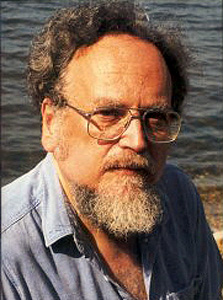Arnold Rosner (1945-2013)

American composer Arnold Rosner died in his Brooklyn apartment on his 68th birthday, November 8, 2013. Rosner was born in New York City, where his father owned a candy store. He attended the Bronx High School of Science, NYU, and the University of Buffalo, where he earned the first doctorate in music granted by the State University of New York. Rosner had been on the faculty of Kingsborough Community College (CUNY) for several decades. He leaves behind a sister, Irene.
Rosner was one of the true maverick composers of his generation. In some ways it is easier to define his approach to music by what he shunned than by what he embraced. Rosner rejected all the compositional styles that seized the limelight during the course of his career. Though in many ways a staunch traditionalist, he didn’t align himself with more conservative approaches either. While he decried what he saw as the sterility of the serialists and the experimentalists, as well as the mindlessness of the minimalists, he also loathed the sentimentality of the neo-romantics and the dry formalism of the neo-classicists. He developed his vision of a musical ideal around the time he entered high school, and, though he refined and elaborated this vision throughout his life, he never repudiated it, and paid a significant price for his stubborn adherence to it.
Rosner’s music was predicated on the modal polyphony of the Renaissance and early Baroque, as well as on the pre-tonal harmony of late Medieval dance music, and the free triadicism and rhythmic phraseology of that music underlay his entire output, regardless of how far from those sources he ventured. He saw a world of difference between the free triadicism of, say, Monteverdi or Gesualdo, and the major-minor dualism of Classical 18th-century tonality, which he despised and found insipid. He seasoned these rather austere elements with a pinch of Judaica, and combined them with the rich luxuriance of 19th-century orchestration and a Romantic sense of drama. In some works he displayed a Hindemithian vigor and in others the stark brutality of Shostakovich. These basic elements may seem antithetical to each other in many ways, but therein lies the remarkable individuality of Rosner’s music. When he discovered pieces such as the Fantasia on a Theme of Thomas Tallis by Vaughan Williams, Mysterious Mountain by Alan Hovhaness, the symphonies of Carl Nielsen, and the Eleventh Symphony of Shostakovich, he regarded them as precedents that justified the ideal vision he sought to realize. But what makes Rosner’s music worthy of serious consideration, rather than being merely a homogenization of earlier styles, is the way that his unusual language is capable of embracing an enormous expressive range—far broader than one might imagine possible—from serene beauty to violent rage, with many points in between. And despite its fusion of seemingly incongruous elements, most of his music is readily accessible to even untutored listeners.
Fiercely independent, Rosner shunned any of the institutions or organizations with which he might have aligned himself. Although he earned his living in an academic setting, he never took advantage of the opportunities open to academic composers. As desperately as he sought acceptance, he would have it only on his own terms. Without his cultivating opportunities for performance, his music initially attracted the attention of only a small number of equally independent-minded musicians and music lovers. As the years passed, his works gained no foothold within the world of professional musicians, and he became increasingly embittered. Deciding simply to bypass the conventional music institutions, he began to produce recordings of his music and make them available to the public. These recordings, where a sizable portion of his output may be heard, were highly praised by most of the review media, and Rosner began to develop a modest following of committed enthusiasts who recognized the value of his unique voice.
Rosner’s final output comprises more than a hundred compositions: three operas, eight symphonies, six string quartets, three a cappella Mass settings and a large Requiem Mass, three piano sonatas, and a host of other orchestral, choral, and chamber works. Two of his symphonies have been released by Naxos, and six CDs of his music can be found on the Albany label. At the time of his death he was in the middle of a project with the University of Houston Wind Ensemble to record all his music for wind band. Performance materials for Rosner’s music are available from Carson Cooman, www.carsoncooman.com.
Link: http://www.newmusicbox.org/articles/in-memoriam-arnold-rosner-1945-2013/